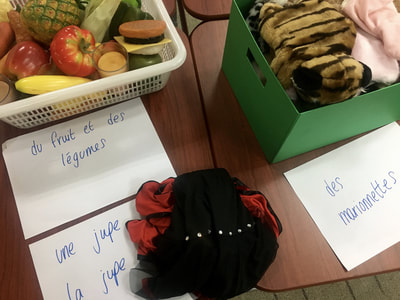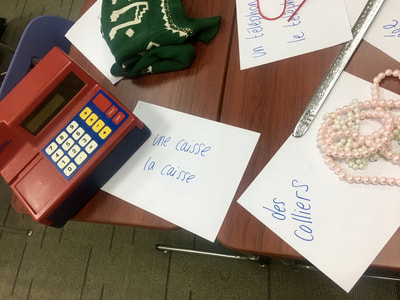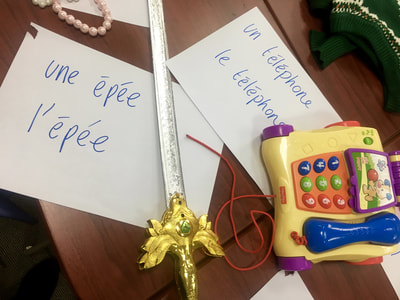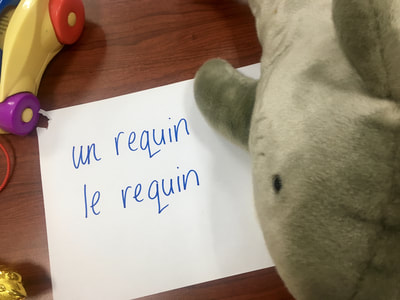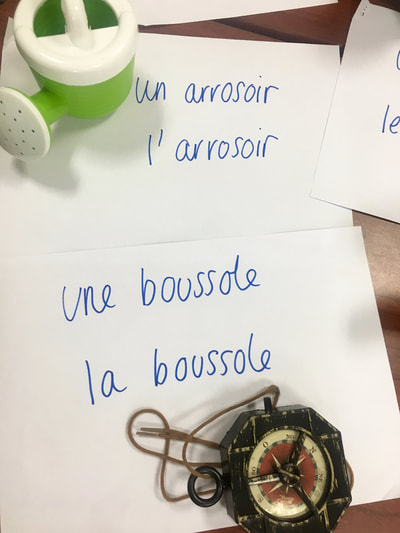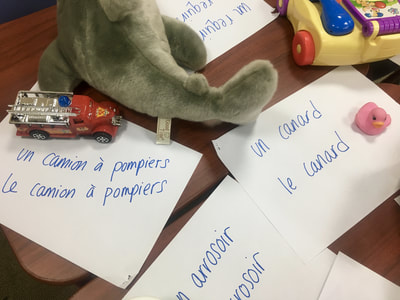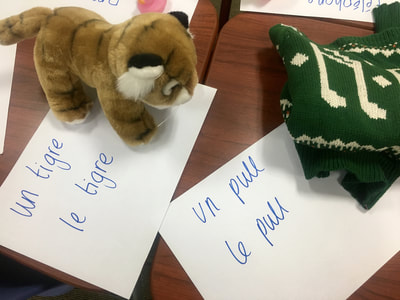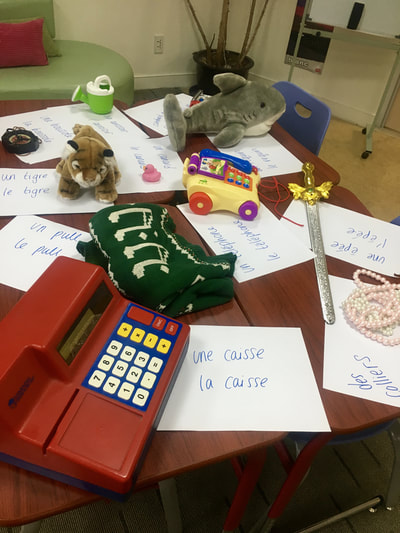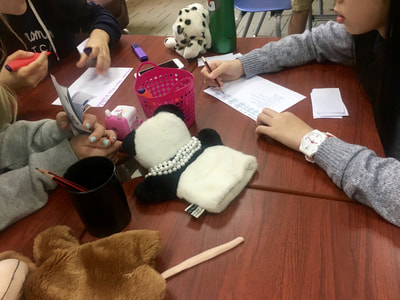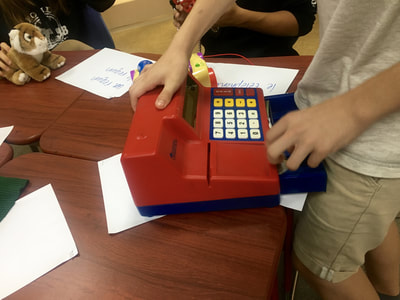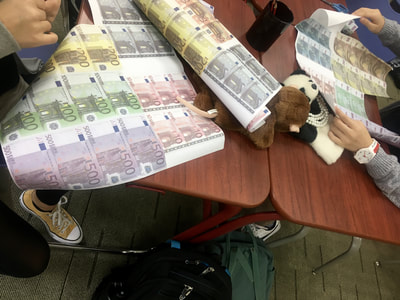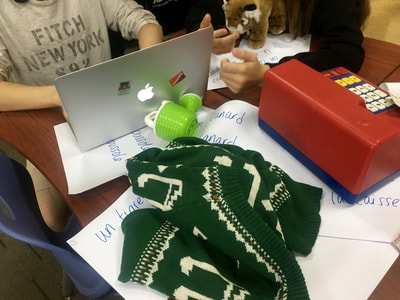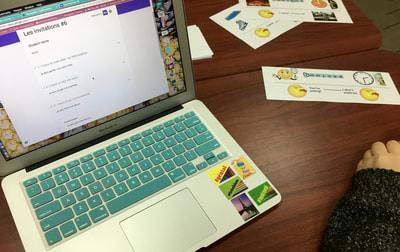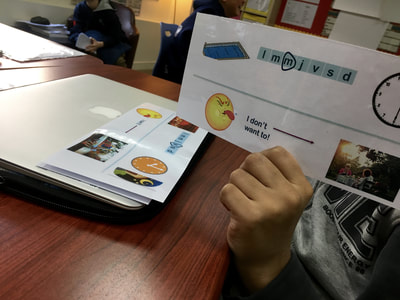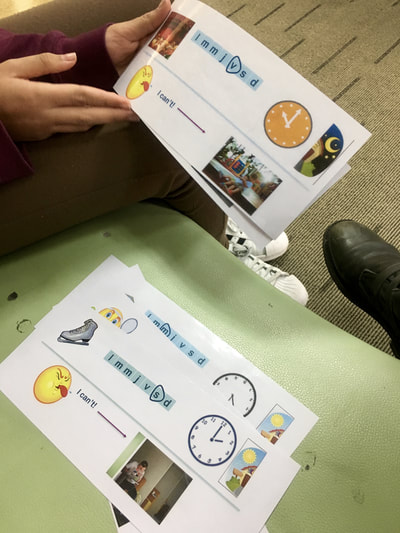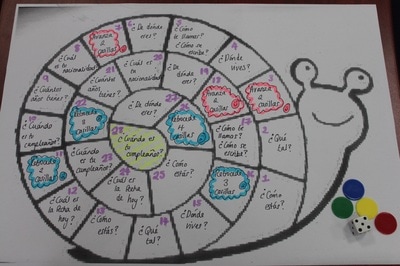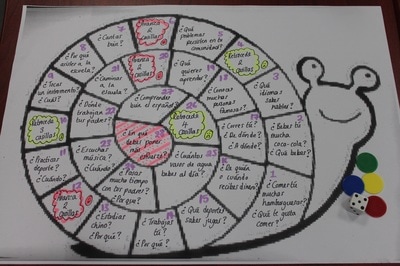|
The students have just finished their summative assessment for their unit "accent impacts the message we communicate". The students have regularly practised their accent and pronunciation and they have also learned a huge amount of questions, vocabulary and phrases. So, today I though that it would be a good opportunity to take these skills and knowledge and adapt them to new situations and allow students the opportunity to be creative. I already have some props and costumes in my classroom and this morning I raided my son's chest of toys for additional fun items to bring into school. I laid the props out in preparation for the arrival of the students and wrote out the vocabulary ready for them to use. Next, I organised the students into groups and they started to create their dialogues. As always, the students were super creative and among the scenarios we had a dialogue at the train station that was performed with puppets, and a dialogue for buying food in a shop where the shopkeeper was robbed and they had to call the police.
0 Comments
In the current unity of inquiry in French Phase 1 we are working on the skill of accent and how it impacts our communication of messages. In this unit we practise dialogues in the following locations around the community:
We are now looking at conversations that we have at the market. I love teaching about the market in France because it is so culturally important. The song <<Marchés de Provence>> by Gilbert Bécaud. The lyrics of the song conjure up a wonderful image of a beautiful, sunny market place full of children dancing and laughing. The song also includes key vocabulary on foods and quantities that are included in out unit of inquiry. There is a wonderful old video on YouTube that also features Brigitte Bardot and the gap-fill activity that I use with my students is below. At the start of every class we are completing an exercise to improve our accent and pronunciation. To read more about the activities we are doing, please see this post here.
One of the things that I love about the MYP is the way it allows me to focus a unit of study on concepts and skills. Pre-MYP I must admit that when I taught a topic such as Free Time, I felt a bit lost with where to start and finish. There were so many different options to focus on such as:
...and the list goes on. Typically I would try to cover as much as possible drawing on culturally authentic resources (such as La Tour de France, TV Guides, Sports Centre activity lists etc.), and then try to assess all four skills of reading, listening, speaking and writing. Phew! It was a little overwhelming for me, and probably for my students as well. Cue our school's transition to the MYP Framework. Now I separate out how I teach the topic of Free Time, and have clear guided focuses for each unit. Currently, I am teaching a unit called INVITATIONS to my French Phase 1 class. The statement of Inquiry (SOI) is "Conversations allows us to exchange attitudes and connect with others". Therefore our key concept is connections and the related concepts form (conversations) and purpose (exchange and connect). Our summative assessment will asses criteria C and D and is explicitly linked to the SOI; the students will use picture prompts to practice role-play conversations in which they will accept invitations and refuse invitations, and therefore exchange attitudes and connect. See the prompt cards for invitations and acceptances below. And here are the prompt cards that I made for invitations and refusals. So,what do I teach this unit?
As lesson starters we do activities focussing on accent and pronunciation, be it tongue twisters, songs or work from the SOS pronunciation packet (see post on this here), and we frequently practice the dialogues which become more complex as the students build their knowledge of the grammatical structures and vocabulary. In the summative assessment students work in pairs and choose picture prompt cards at random (the cards are face down). They interact with each other inviting, accepting and refusing as I record and mark their interactions for communication and accuracy. In this unit the students will also be assessed on criteria B. On page 30 of Expo OCR GCSE Vert and page 30 of Expo OCR GCSE rouge there are examples of authentic French adverts for music festivals, dance shows and cinema viewings. These adverts provide the perfect opportunity for students to demonstrate comprehension of written and visual text and to apply their knowledge of invitations and acceptances and refusals in writing. Please see below the practice formative assessment that I have made for my students. And here is the summative assessment that I have made for my students. I would welcome any feedback or ideas that you have about this unit of inquiry or the above assessments. A former colleague of mine and good friend Laure Kruger found this snail template and shared it with to be used as a speaking practice activity. It is so simple and I love to use it for students to practice questions and answers, particularly to revise prior to an assessment. How does it work? Students each have coloured counters and share a dice. Students throw the dice, move that number of squares and then answer the question in the square. If they can't answer the question they miss a go and they may land on a square requiring them to move forwards or backwards. To win the game they must throw an exact number to finish in the centre square. It often takes a few attempts for them to throw the exact number they need and because they keep having to go backwards again, they keep practising and re-practicing the same questions. Take a look at some examples I used recently in class. The evolution game of pierre, papier, ciseaux is one of my absolute favourites for motivating my students to speak French. The students love this game and jump at the opportunity to get out of their chairs and practise their dialogues. I found this game on Chris Fuller's Blog and have adapted its use for French. Basically it goes likes this... All the kids start off as eggs (they make an egg shape over their heads), and the idea is to evolve up to a superhero! Eggs – chickens – birds - elephants – superheroes. Students go around the room practsiing a dialogue with other students. e.g. D'ou viens tu? Je viens de l'Angleterre. Once they have finished their conversation they have a game of rock, paper, scissors. The student who wins becomes a chicken (and flap their chicken wings),and the student who loses stays as an egg (make an egg shape over their heads). The conversations continue. Students have to find someone in the room who is the same stage of evolution as them i.e. chickens talk to chickens and eggs talk to eggs. And so it continues….as you win, you move up the evolutionary scale - Eggs – chickens – birds - elephants – superheroes. Once I have two students who have become superheroes I ask them to stand in front of the class while the other students sit down. The two superheros practise their dialogue and this time the winner of rock, paper, scissors is the ultimate winner. I give out house points and stickers as prizes. Here is the PPT slide I project to remind the students of the evolutionary progression. |
Juliet OrchardI have been teaching French and Spanish for 13 years. I qualified and started teaching in the UK, and I currently work at Shanghai Community International School, China. I have experience teaching GCSEs and IB DP and MYP. Find out more about me within these blog pages or below at LinkedIn. Archives
October 2017
Categories |
